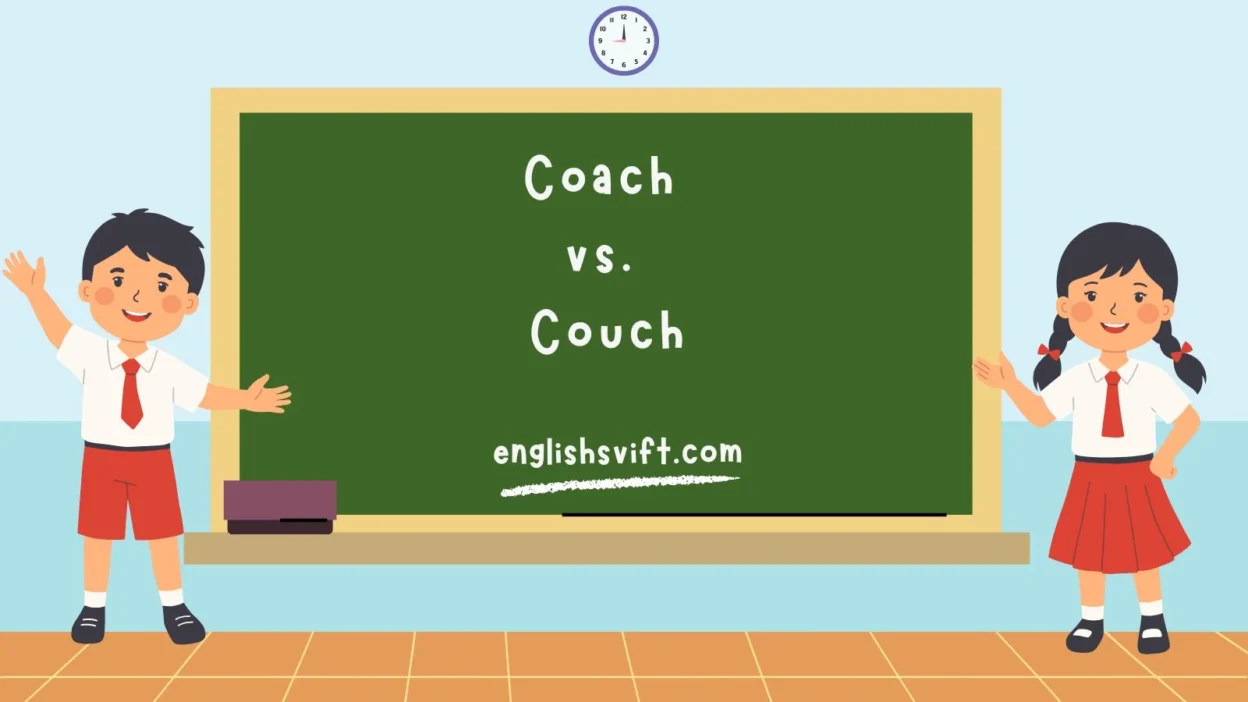Have you ever texted a friend, “I’m spending the evening with my coach,” when you meant your couch? That one letter makes a world of difference — and in English, tiny changes can lead to big misunderstandings. While coach and couch sound alike, their meanings, origins, and usage could not be more different.
This guide will clear up the confusion once and for all. We’ll explore meanings, grammar roles, real-life examples, etymology, pronunciation tips, and even memory tricks to help you get it right every time. Plus, we’ll break things down in side-by-side tables so you can see the contrasts at a glance.
Understanding the Coach vs. Couch Confusion
The similarity between “coach” and “couch” lies in sound and spelling — both are short, single-syllable words starting with “co” and ending in “ch.” For English learners (and even native speakers), this can trigger mix-ups in writing and speech.
| Factor | Coach | Couch |
| Letters | C-O-A-C-H | C-O-U-C-H |
| Shared Sounds | “co” + “ch” | “co” + “ch” |
| Key Difference | Middle vowel “oa” | Middle vowel “ou” |
| Confusion Type | Pronunciation & spelling | Pronunciation & spelling |
What “Coach” Means in Everyday English
In modern English, “coach” has several meanings, but they all circle back to guidance, instruction, or transportation.
As a noun:
- A person who teaches, trains, or mentors others.
- A vehicle for long-distance travel (bus, railway car).
As a verb:
- To train, guide, or instruct someone to improve performance.
Examples:
- The tennis coach helped her refine her backhand.
- We took a coach from London to Edinburgh.
The Many Roles of a Coach: Mentor, Trainer, Strategist
A coach can wear many hats depending on the context. Here’s how it varies:
| Type of Coach | Field | Role | Example |
| Sports Coach | Athletics, football, basketball | Plans training, motivates players | The coach led the team to victory. |
| Life Coach | Personal development | Helps clients set goals, improve life | Her life coach helped her find a new career path. |
| Business Coach | Corporate & entrepreneurship | Improves leadership and productivity | The CEO hired a business coach to improve team performance. |
| Travel Coach | Transportation | Describes passenger vehicles | We traveled overnight in a comfortable coach. |
From Sports to Business: How Coaching Shapes Success
A good coach is more than an instructor. They:
- Identify strengths and weaknesses.
- Create strategies for improvement.
- Offer motivation during tough times.
- Provide feedback that encourages growth.
“A coach sees your potential when you can’t see it yourself.”
“Couch” in the English Language: More Than Just Furniture
“Couch” instantly makes most people think of comfortable seating — but it has broader meanings.
As a noun:
- An upholstered piece of furniture designed for sitting or reclining.
As a verb:
- To express something carefully or tactfully (She couched her criticism gently.).
Different Types of Couches and Their Unique Features
| Type | Description | Example |
| Sectional | Multi-piece seating, customizable shapes | The sectional fit perfectly in the living room. |
| Loveseat | Small couch for two people | They bought a velvet loveseat for the reading nook. |
| Chaise Lounge | Long chair for reclining | She relaxed on the chaise with a book. |
| Sleeper Sofa | Converts into a bed | The sleeper sofa is perfect for overnight guests. |
The Pronunciation Puzzle: Coach /koʊtʃ/ vs. Couch /kaʊtʃ/
IPA Pronunciation:
- Coach: /koʊtʃ/ — rhymes with roach.
- Couch: /kaʊtʃ/ — rhymes with ouch.
Tip: Think of “ouch” in “couch” — it’s where you rest after something hurts.
Spelling Differences and Why One Letter Changes Everything
That single vowel shift from “oa” to “ou” transforms the meaning:
- “Oa” → coach → guidance or vehicle.
- “Ou” → couch → seating or careful phrasing.
Etymology of “Coach”: From Carriages to Champions
- Mid-16th century: From Hungarian kocsi (“of Kocs”), a village famous for its carriages.
- 1550s: Used for horse-drawn vehicles.
- 1830s: Used in railway passenger transport.
- 1860s: Figuratively meant a tutor or trainer.
Etymology of “Couch”: From Beds to Living Room Icons
- 14th century: From Old French couche (a bed or place to lie down).
- Latin: collocare — “to lay” or “to place”.
- 1950s: Slang term “couch potato” emerged.
When “Coach” Is a Verb vs. a Noun
Noun:
The volleyball coach gave a pep talk before the game.
Verb:
She coached him on public speaking techniques.
When “Couch” Is a Verb vs. a Noun
Noun:
The leather couch became the centerpiece of the living room.
Verb:
He couched his feedback in polite terms.
Common Mistakes English Learners Make with Coach & Couch
- Mispronouncing “couch” as /koʊtʃ/.
- Spelling mix-ups in quick typing.
- Using “coach” when referring to furniture.
Real-Life Examples: When Using the Wrong Word Causes Confusion
| Incorrect Sentence | Why It’s Wrong | Correct Version |
| I’m buying a new coach for my living room. | “Coach” refers to a trainer or vehicle, not furniture. | I’m buying a new couch for my living room. |
| The basketball couch was very motivating. | “Couch” here is incorrect; it’s about a person. | The basketball coach was very motivating. |
Synonyms for “Coach” and “Couch” in Everyday Use
| Coach Synonyms | Couch Synonyms |
| Trainer, instructor, mentor, tutor, guide | Sofa, settee, divan, loveseat, chaise |
Side-by-Side Table: Comparing Meanings, Origins, and Uses
| Feature | Coach | Couch |
| Primary Meaning | Instructor or vehicle | Furniture or tactful expression |
| Origin | Hungarian “kocsi” | Old French “couche” |
| Common Contexts | Sports, travel, personal development | Home decor, speaking style |
| Plural | Coaches | Couches |
Coach in Sports vs. Couch in Home Decor
Coaches drive performance. Couches hold people. One takes you forward, the other lets you relax.
How to Remember the Difference Between Coach & Couch
- Memory trick: “Ouch” is in couch — where you relax after a hard day.
- Coach: Someone who approaches your potential.
Cultural Associations of Coaches and Couches Around the World
- In America, “coach” is big in sports culture.
- In Europe, “coach” often refers to a bus.
- In France, “couche” still means a bed.
Fun Idioms, Slang, and Phrases Using “Coach” and “Couch”
- Coach potato — Not a real phrase, but a funny mix-up of “couch potato.”
- In the coach seat — Traveling economy class.
The Psychology Behind Why We Mix Up Similar-Sounding Words
Our brains process sounds faster than letters, which is why homophones and near-homophones get mixed.
Coach or Couch in Pop Culture, Memes, and Social Media
- “Couch goals” — dreamy furniture on Instagram.
- “Coach mentality” — trending in self-improvement TikToks.
Tips for Learners: Speaking and Writing with Confidence
- Practice pronunciation daily.
- Use visual cues like flashcards.
- Double-check spelling before sending messages.
Quick Recap: Getting It Right Every Time
| Word | Meaning | Quick Tip |
| Coach | Trainer or vehicle | Think “approach goals.” |
| Couch | Furniture or phrasing | Think “ouch” and relaxation. |
FAQs
Q1: Is “coach” ever used for furniture?
A: No, “coach” is never used to mean furniture in standard English.
Q2: Can “couch” mean something other than seating?
A: Yes, it can mean to phrase something carefully.
Q3: Are “coach” and “couch” homophones?
A: Not exactly; they sound similar but have different vowels.
Q4: How can I avoid mixing them up?
A: Focus on the vowel sound — “oa” in coach, “ou” in couch.
Q5: Which came first historically?
A: “Couch” (14th century) predates “coach” (16th century).
Conclusion
English is full of similar-looking words that can trip up even the most confident speakers. Coach and couch may share letters, but their worlds couldn’t be more different — one drives you to success, the other invites you to sit back and relax. By remembering their unique meanings, origins, and contexts, you’ll speak and write with clarity, precision, and confidence.



